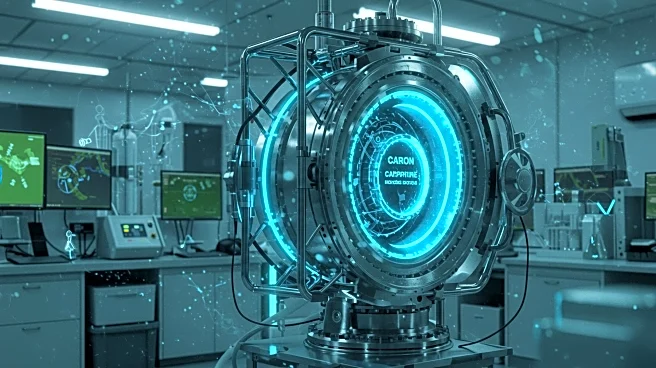What's Happening?
BKV, a Denver-based energy company, is making strides in carbon capture and storage (CCS) projects. The company reported that its Barnett Zero facility injected over 30,000 metric tons of CO2 during the second quarter. BKV aims to inject 1 million tons per year by the end of 2027, with two projects reaching final investment decisions and three more progressing towards approval from the U.S. Environmental Protection Agency. The company has submitted seven Class VI well permit applications for geologic sequestration, which are under review. BKV also announced a carbon capture project at an East Texas gas plant targeting 70,000 metric tons of CO2 annually for permanent sequestration. The Eagle Ford project, in partnership with Copenhagen Infrastructure Partners, is expected to start in the first quarter of 2026.
Why It's Important?
BKV's advancements in CCS projects are significant for the energy sector's efforts to mitigate climate change. By permanently storing captured CO2, BKV contributes to reducing greenhouse gas emissions. The company's focus on carbon sequestered gas (CSG) offers a carbon-neutral natural gas option, appealing to companies aiming to lower their carbon intensity scores. This development aligns with broader industry trends towards sustainable energy solutions. BKV's initiatives could influence other energy companies to adopt similar strategies, potentially leading to a shift in the market towards more environmentally friendly practices.
What's Next?
BKV plans to continue expanding its CCS projects, with a goal of achieving a CO2 injection run rate of 1 million tons per year by 2027. The company is actively discussing power needs with large data center companies and analyzing market dynamics around power purchase agreements to optimize its Temple power generation assets. BKV's ongoing efforts in CCS and CSG could lead to further partnerships and investments in sustainable energy solutions, potentially impacting the energy market and regulatory policies.
Beyond the Headlines
The development of CCS projects by BKV highlights the growing importance of carbon management in the energy sector. As companies seek to reduce their carbon footprints, CCS offers a viable solution for achieving carbon neutrality. BKV's initiatives may prompt discussions on the ethical and regulatory aspects of carbon sequestration, including the long-term environmental impacts and the role of government policies in supporting such projects.










